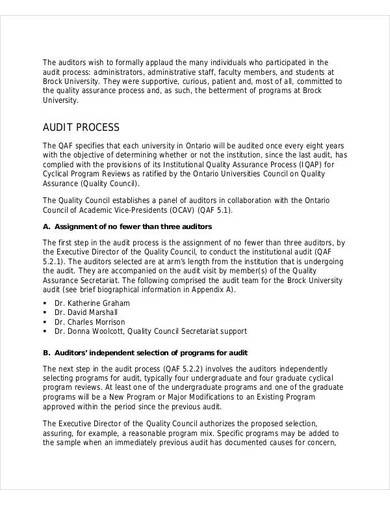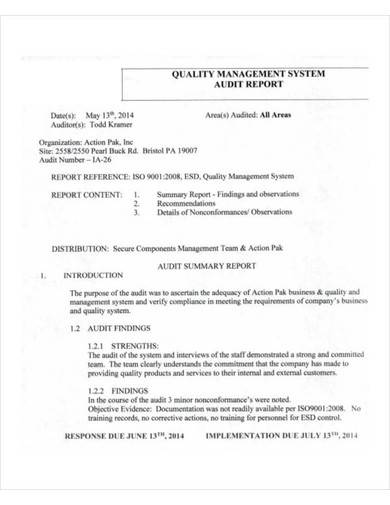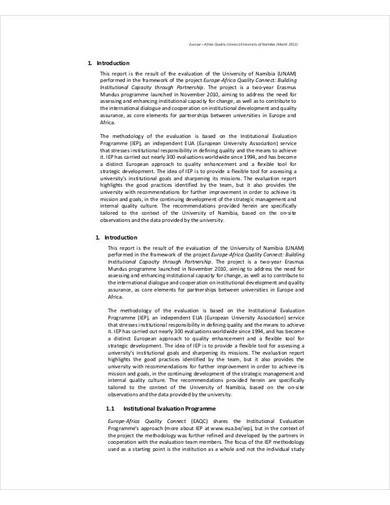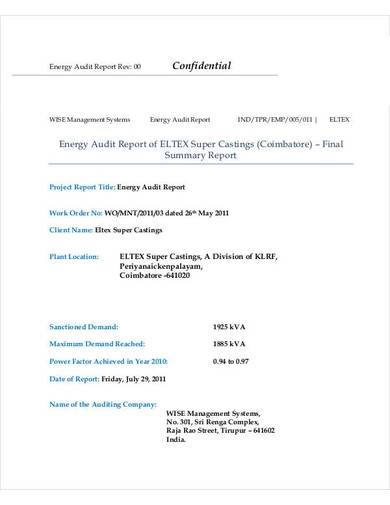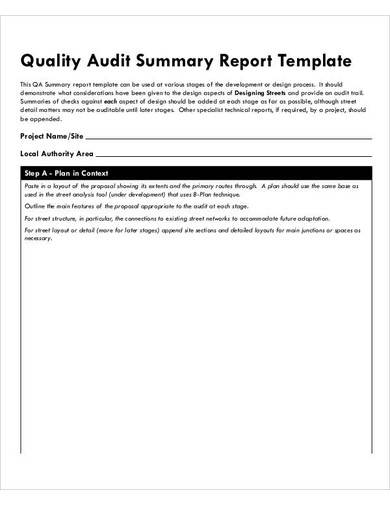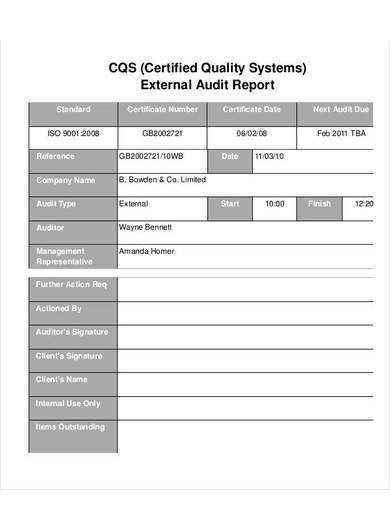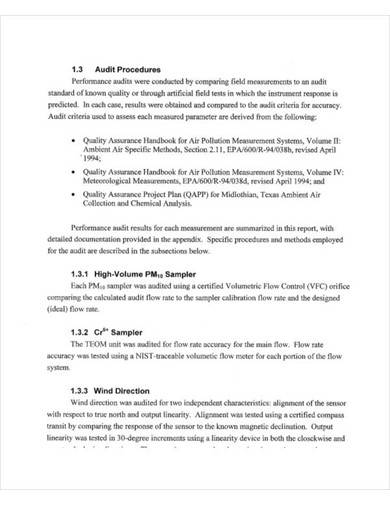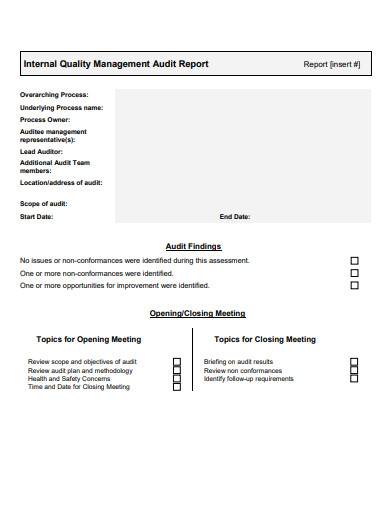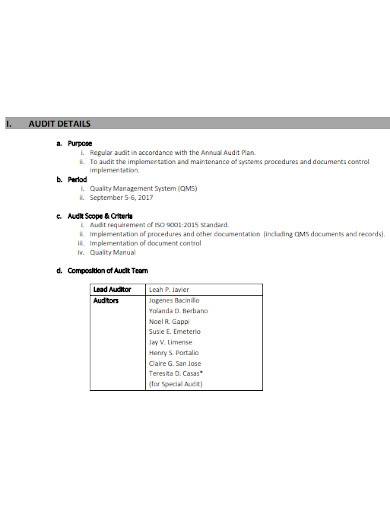Reputation is a matter that every company invests there resources for. I guess you already know that. In your case, one way to do it is to ensure that your company adheres to the standard quality in terms of services you offer and the products that you sell. To comply with this quality benchmark, you will need to maintain a strong quality management plan, and with quality audit reports, you can perform your job more seamlessly.
FREE 10+ Quality Audit Report Samples
Whether you are incorporating it to a spa and salon business plan or a nonprofit business plan, using a quality audit to various aspects of your business will ensure that your company will deliver with standards. With that said, implement an effective quality audit by using a quality audit report template. In this section, we have prepared quality audit report templates and examples for you to choose from.
1. Quality Audit Report Template
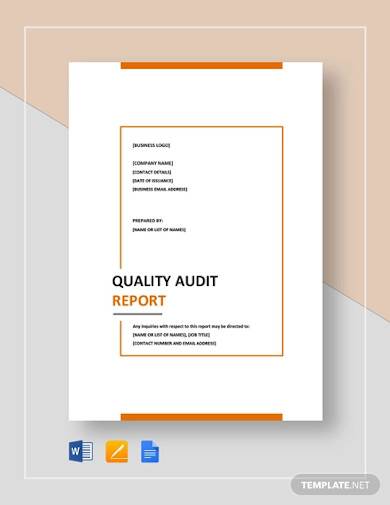
2. Internal Quality Audit Report Template
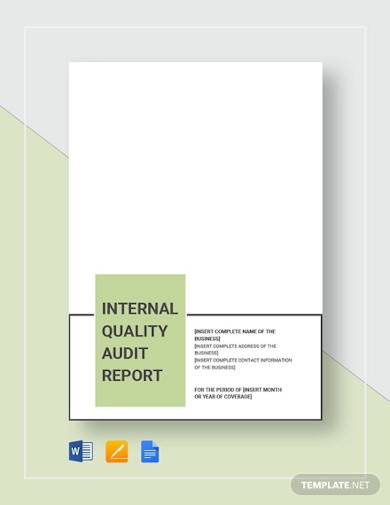
3. Quality Assurance Audit Report
4. Quality Management System Audit Report
5. Sample Quality Assurance Audit Report
6. Energy Audit Report Template
7. Quality Audit Summary Report Template
8. Quality External Audit Report Sample
9. Quality Assurance Audit Report Format
10. Internal Quality Management Audit Report
11. Internal Quality Audit Report Example
What Is Quality Audit Report?
A quality audit report is a document that you can use to gather the data that you need for a systematic evaluation of the products and services that your company provides. Additionally, the coverage of this report does not limit your services and products. You can also use it to maintain sound company management, business processes, and systems.
According to an article posted in Statista on March 9, 2020, the quality assurance budget allocation in the IT industry has started to decrease after its number hit 25% in 2015. It means that existing companies have figured out a way to provide IT products and services, such as software products, with high-quality assurance in a cheaper way.
How To Write a Useful Quality Audit Report
The statistics that we have mentioned earlier may give you the impression that there are more cost-effective ways to sell high-quality products. However, you should know that regardless of what technique you are going to use in delivering high-quality products and services, creating an audit report is a smart move as it gives you an idea of what approach you are going to use for this task. To create a more useful report, follow the tips that we are providing in this section.
1. Write According to the Audience
Not everyone knows the process of the quality assurance system that you are using. Therefore, just like writing a construction business proposal, it is crucial to identify who your recipients are before you send out an audit report. For example, you are creating a report for internal use. Most likely, your recipients are the department managers. Therefore, you can assure that they can understand the jargon and technical terms that they incorporate in the report.
2. Obtain a Template
Many of us have experiences where we forgot to include certain details in sending a report that led to unnecessary call outs. That is why it is crucial to maintain a template that you can use to create and send audit reports to particular recipients. In this way, you can save time since it allows you to create a predefined document where you only have to change the necessary parts. Aside from that, it can help you control the information that you are going to send externally, avoiding accidental sending of internal data.
3. Use an Audit Checklist
You cannot guarantee that a corrective action plan can take place within the day of conducting a quality audit. With that said, there are chances for you to forget the essential information that you need in deciding the appropriate action plan. To avoid it from happening, make sure that you take note of all the necessary information that you have gathered during the audit. To ensure that you don’t leave anything out, use an audit checklist. By doing it, you will also avoid problems and confusion if you need to endorse the task to a different auditor.
Speaking of confusion, you should also avoid softening the blow of a particular finding to avoid confusion if you need someone else to finish the task. Write it without emotions and feelings. By doing so, whoever reads the report can determine the appropriate action plan that needs to take place.
4. Timely Send the Report
Creating a corrective action plan months after the audit took place is not really a smart move. It can make an impression to the witnesses and the stakeholders that the company tolerates procrastinating, which will not do good in its reputation. Therefore, it is essential to proactively execute processes timely, regardless if nobody asks for it. Ensure that you don’t forget to send the necessary reports by including the time that you need to send the document in your audit schedule.
FAQs
What is the purpose of creating an audit report?
By creating an audit report, you can summarize the findings of an audit, making it easier for the recipients of the report to understand and interpret the information more clearly.
What are the contents of an audit report?
According to ISO 19011: 2002 standards, an audit report should include the following:
- audit scopes and objectives
- audit plan
- identification of the reference documents and standards
- identification of the auditor
- audit dates and length
- identification of the interviewees
- best practices and opportunities to highlight
- violations
- distribution list
What are the different types of an audit?
- Internal Quality Audit
- External Audit
- Third-party Audit
A quality audit does not just ensure that the appearance of a company is attractive. It also strengthens the company from within, making it an essential business process to maintain. By ensuring that you create the quality audit reports properly, you are protecting the reputation of your business and strengthen its relationship with its stakeholders and consumers.
Related Posts
FREE 9+ Stock Audit Report Samples & Templates in PDF MS Word
FREE 10+ Environmental Audit Report Samples & Templates in PDF ...
FREE 36+ Report Templates in Google Docs MS Word | Apple ...
FREE 16+ Sample Audit Reports in PDF MS Word
FREE 11+ Sample Inspection Reports in Google Docs MS Word ...
FREE 11+ Sample Audit Reports in PDF MS Word
FREE 9+ Sample Audit Plan Templates in MS Word PDF
FREE 16+ HR Audit Report Templates in PDF Google Doc | MS ...
FREE 8+ Sample Job Evaluation Reports in MS Word PDF
FREE 8+ Access Audit Report Samples in PDF MS Word
FREE 14+ Internal Audit Report Templates in PDF MS Word
FREE 16+ Sample Service Reports in PDF Google Docs | MS Word ...
FREE 6+ Sample Problem Report Templates in PDF
FREE 11+ Audit Schedule Samples and Templates in PDF MS ...
FREE 17+ Audit Report Samples in MS Words PDF | Pages

